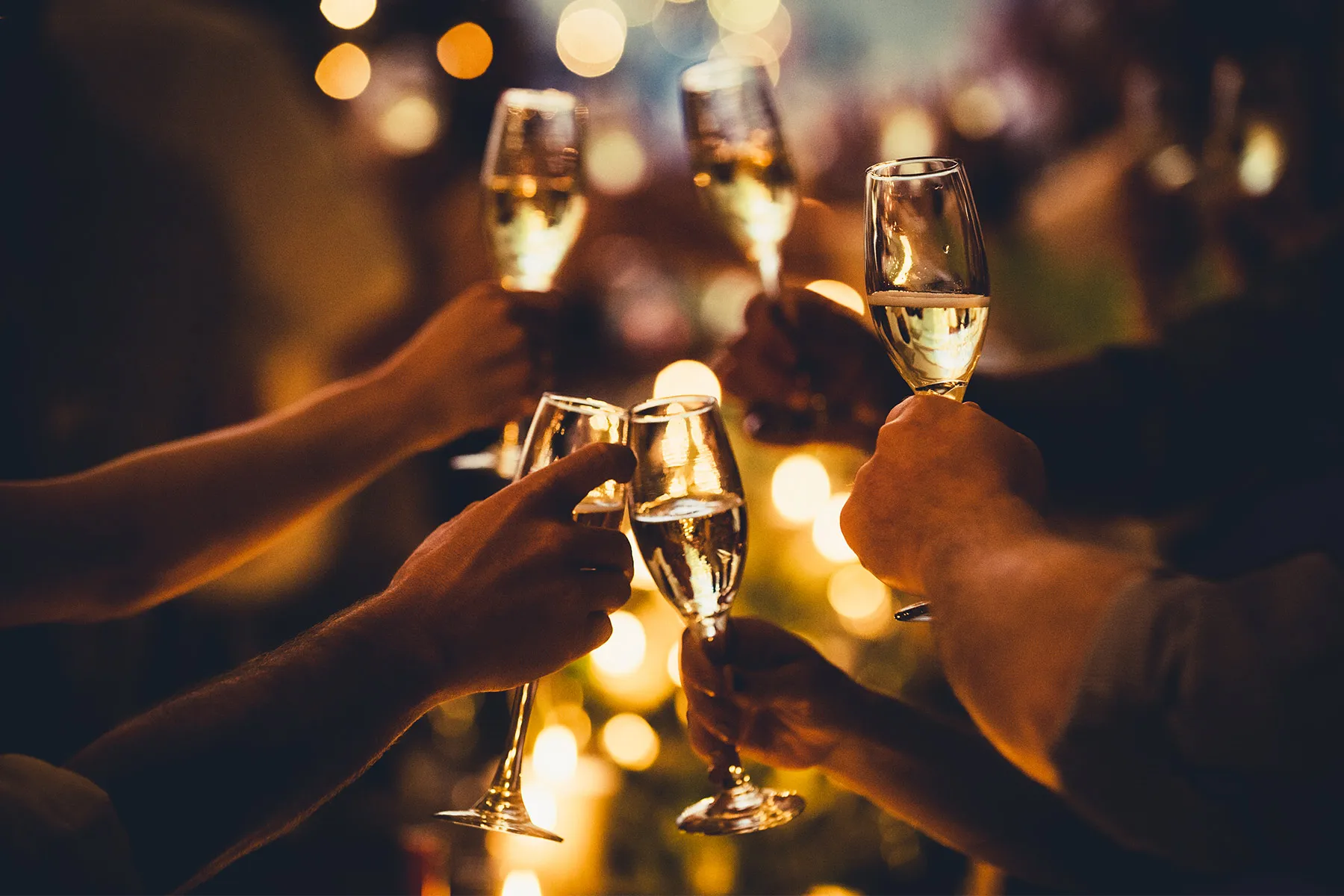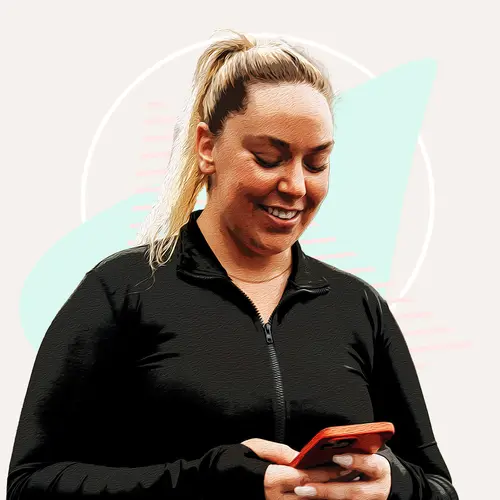
'Tis the season to encounter all of your favorite foods -- including many that can nudge the numbers on your scale upwards. Instead of obsessing over it, you might want to readjust your expectations.
"If you weigh the same on Jan. 2 as you did the day before Thanksgiving, declare victory," says clinical psychologist Gerard J. Musante, PhD. "Don't try to lose weight over the holidays. Instead go into maintenance mode." This advice comes from the man who pioneered a behavioral approach to weight management and founded Structure House, a residential weight loss program in Durham, N.C., 25 years ago.
So you have the best intentions of getting through the holidays without gaining weight, but your resolve vanishes with one or two drinks of wine, beer, or eggnog. It's no secret that alcohol can affect how you behave -- including what you eat.
Alcohol Is Sneaky
Logic would tell you that if you take in 300 calories by drinking two beers, your body will compensate and you'll eat less than if you hadn't had the beers. Not so fast.
"Fluid calories from alcohol don't give as strong a feeling of fullness, so people tend to eat more," says Richard D. Mattes, MPH, PhD, RD, who researched this subject. Mattes, who is professor of foods and nutrition at Purdue University in West Lafayette, Ind., notes that other beverages such as soda, fruit juice, sports drinks, or specialty teas or coffees have a similar effect.
Still, Mattes points to studies showing that moderate drinkers weigh no more than abstainers. In these studies, the drinkers and abstainers took in the same number of calories from food, but the drinkers added calories from alcohol.
"If they're taking in more calories, how can they weigh the same or less?" asks Mattes. "It's a fascinating issue and an open question as to how efficiently energy from alcohol is used."
Should You Eat Before a Holiday Event?
Try to follow your normal routine, says Pat Vasconcellos, RD. "Eat in the morning and have snacks as usual. Don't think because you're eating dinner at 5 p.m. you should skip your snack at 3 p.m. Eating the snack will take the edge off your appetite."
Having food in your stomach is also important to slow the absorption of alcohol, Vasconcellos says. Mattes agrees but says eating before a holiday event won't necessarily mean fewer calories. "If you eat a snack, the question is whether you'll continue to eat what you would have eaten had you not eaten the snack or if you'll eat less. If you eat the snack far in advance, its effect on the next eating occasion will be very minimal. If you've added an eating occasion to your day's regimen, it might be counterproductive."
Chances are you've been around this block before. You'll know if eating before a holiday event will curb your need to indulge or will only compound the problem.
Have a Holiday Game Plan
"If you have four or five parties to go to, do you have to overindulge at all of them?" asks Vasconcellos, who has a private weight management practice in Boston. "One party doesn't put you over the top, but if you go to two or three parties a week you could add 700 to 1,000 calories depending on what you drink."
Musante advises avoiding alcohol altogether. "If you've been good with your diet, a small amount of alcohol might have a greater effect. For example, on a 1,500-calorie diet, a couple of drinks … and all your best intentions go out the window."
His advice? "Recognize that you've been through holidays before. Sit down and envision what you're going to encounter."
If you're going to a buffet dinner alone, first walk through the line without a plate and survey the scene. "Go off some place and think about what you can have as a structured meal. Then take the plate and execute that."
If you're with a supportive friend, try this approach: "Say, ''I'll prepare your plate, and you prepare mine.' Then sit down and eat that meal, and spend the rest of the evening with sparkling water."
Then there are the family get-togethers where a relative says, "Come on, it's the holidays. Why not have another cup of eggnog?" Musante says, "You have work to do to get family members on your side."
Mattes recommends two alternative approaches to managing drinking and eating behaviors. "Continue to drink what you would drink, but purposely watch what you eat, and compensate for those calories by eating less of other things. It will have to be a conscious effort because the beverages don't lead to a clear satiety signal that would cause you to spontaneously stop eating." (Satiety means feeling full.)
You could also choose to drink no-calorie beverages, such as water, diet sodas, coffee, or tea. "It's not fluid per se that promotes weight gain," Mattes says. "It's energy-yielding fluids that promote weight gain. We have to stay hydrated, but make a good choice."
Here are some tips for limiting alcohol calories during holiday festivities:
- Drink water. "Alcohol is a diuretic," Vasconcellos says. "When you get thirsty and you're inclined to have another drink, make it water instead."
- Stretch your drinks. Add sparkling water or ice cubes, and nurse a drink all night.
- For mixed drinks, use diet soda, low-calorie fruit juice, or seltzer.
- Choose lower-calorie drinks, such as dry wine, instead of eggnog.
- Have the bartender mix a skinny version of a favorite, like the White Russian. Mix 1.5 ounces each of Kahlua and vodka with 2 ounces of soymilk for a total of 298 calories compared with 508 calories when made with cream. Make it with nonfat milk for a total of 251 calories.
- Choose coffee. If it's loaded with sugary flavorings, be aware of that.
- Be a designated driver. Don't drink at all if you're going to drive. Your friends will be grateful -- and safe. If you do end up drinking, don't drive.
Eat and Drink in Moderation -- and Enjoy the Holidays
We all know it's easier to prevent weight gain than to take weight off. "Falling down at the holidays undermines your confidence and weight loss program," Musante says. "Many people tell me that was their downfall, and they waited until much later in the year to recover." "Don't approach the holidays thinking you'll lose weight," Vasconcellos says. "You'll set yourself up to fail, and you won't be able to enjoy food without feeling guilty. There are so many special foods. Pick and choose."
Here are calorie and carbohydrate counts for some of your favorite drinks from the Joslin Diabetes Center web site:
| Beverage | Amount (ounces) | Calories | Carbohydrates (grams) |
| Beer | 12 | 150 | 14 |
| Light beer | 12 | 100 | 6 |
| 86-proof liquor (gin, rum, vodka, whiskey, Scotch, bourbon) | 1.5 | 105 | trace |
| Red table or rose wine | 4 | 85 | 1 |
| Dry white wine | 4 | 80 | 0.4 |
| Sweet wine | 2 | 90 | 6.5 |
| Light wine | 4 | 55 | 1.3 |
| Wine cooler | 12 | 190 | 22 |
| Champagne | 4 | 100 | 3.6 |
| Sherry | 2 | 75 | 1.5 |
| Sweet sherry/port | 2 | 95 | 7 |
| Dry vermouth | 3 | 105 | 4.2 |
| Sweet vermouth | 3 | 140 | 13.9 |
The National Institute on Alcohol Abuse and Alcoholism (NIAAA) web site defines a standard alcoholic drink as one 12-ounce beer, 5-ounce glass of wine, or 1.5 ounces of 80-proof distilled spirits. Moderate alcohol consumption means no more than two drinks a day for men and no more than one drink a day for women and adults over age 65.

